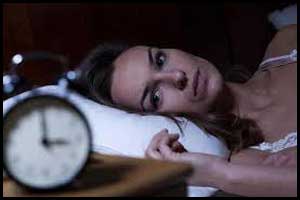- Home
- Editorial
- News
- Practice Guidelines
- Anesthesiology Guidelines
- Cancer Guidelines
- Cardiac Sciences Guidelines
- Critical Care Guidelines
- Dentistry Guidelines
- Dermatology Guidelines
- Diabetes and Endo Guidelines
- Diagnostics Guidelines
- ENT Guidelines
- Featured Practice Guidelines
- Gastroenterology Guidelines
- Geriatrics Guidelines
- Medicine Guidelines
- Nephrology Guidelines
- Neurosciences Guidelines
- Obs and Gynae Guidelines
- Ophthalmology Guidelines
- Orthopaedics Guidelines
- Paediatrics Guidelines
- Psychiatry Guidelines
- Pulmonology Guidelines
- Radiology Guidelines
- Surgery Guidelines
- Urology Guidelines
Adults having poor sleep more prone to dehydration

According to a study by Penn State, Adults having poor sleep are more prone to dehydration. People who sleep just six hours per night -- as opposed to eight -- may have a higher chance of being dehydrated. The findings suggest that those who don't feel well after a night of poor sleep may want to consider dehydration -- not simply poor sleep -- as a cause, and drink more water. The results of the study have been published in the journal SLEEP.
Researchers looked at how sleep affected hydration status and risk of dehydration in U.S. and Chinese adults. In both populations, adults who reported sleeping six hours had significantly more concentrated urine and 16-59 per cent higher odds of being inadequately hydrated compared to adults who slept eight hours on a regular basis at night.
The cause was linked to the way the body's hormonal system regulates hydration.
A hormone called vasopressin is released to help regulate the body's hydration status. It is released throughout the day, as well as during nighttime sleeping hours, which is what the researchers focused on for this study.
"Vasopressin is released both more quickly and later on in the sleep cycle," said lead author Asher Rosinger, assistant professor of biobehavioral health at Penn State. "So, if you're waking up earlier, you might miss that window in which more of the hormone is released, causing a disruption in the body's hydration."
Dehydration negatively affects many of the body's systems and functions, including cognition, mood, physical performance, and others. Long-term or chronic dehydration can lead to more serious problems, such as higher risk of urinary tract infections and kidney stones.
"If you are only getting six hours of sleep a night, it can affect your hydration status," Rosinger said. "This study suggests that if you're not getting enough sleep, and you feel bad or tired the next day, drink extra water."
Two samples of adults were analyzed through the National Health and Nutrition Examination Survey and one sample of adults was analyzed through the Chinese Kailuan Study. More than 20,000 adults were included across the three samples. Participants were surveyed about their sleeping habits, and also provided urine samples which were analyzed by researchers for biomarkers of hydration.
All data is observational and from cross-sectional studies or a cross-sectional wave of a cohort study; therefore, the association results should not be viewed as causal. Future studies should use the same methodology across sites and examine this relationship longitudinally over the course of a week to understand baseline sleep and hydration status, Rosinger said.
For more details click on the link: https://doi.org/10.1093/sleep/zsy210

Disclaimer: This site is primarily intended for healthcare professionals. Any content/information on this website does not replace the advice of medical and/or health professionals and should not be construed as medical/diagnostic advice/endorsement or prescription. Use of this site is subject to our terms of use, privacy policy, advertisement policy. © 2020 Minerva Medical Treatment Pvt Ltd